Secure your financial assets as an expat in Ecuador
Last activity 18 December 2023 by AmericanoNorte
432 Views
19 replies
Subscribe to the topic
Post new topic
Hello everyone,
As we navigate the exciting world of living and working in Ecuador, it's essential to make informed decisions about our financial future.
We’d love to hear about the different investment options available for expats: how to invest in Ecuador or in your home country, explore international options or use online accounts.
To kick off the discussion, here are some guiding questions:
What are the investment opportunities as an expat in Ecuador? Are there any specific investment programs?
In your opinion, what are the advantages and disadvantages of investing internationally ? How is your experience with international investments?
What specific points should you consider regarding your investments as an expat (exchange rate management, international tax obligations or repatriation of funds)?
Do you use specialized banking services for expats, such as multi-currency accounts? What are the pros of these services and how do they help you with your finances?
How is the property market for expats? Are there any specific regulations or aspects we should be aware of when investing in real estate in Ecuador?
What strategies do you apply to save and invest for your financial future in Ecuador and/or to secure your children's financial future?
Thank you very much for sharing your experience with us!
Cheryl
Expat.com Team
What are the investment opportunities in Ecuador?
Last year I began investing in certificates of deposit,
which have been offering annual yields of 8 to 9 percent
at Banco Guayaquil and the two top credit unions or
cooperativas.
The latter include JEP and CPN or Cooperativa
Policía Nacional, which originally was a credit union
for the national police.
These CD's are guaranteed by a federally-authorized
agency, COSEDE, up to 32,000 USD on a model
similar to the US guarantor FDIC.
cccmedia
What are the advantages and disadvantages
of investing internationally?
My primary assets in Ecuador are my Quito condo
and my CD and bank-account balances.
I also have bank and brokerage accounts that are
USA-based.
An advantage is diversification. Students of
USA history know that in the first half of the
20th century, the government prohibited ownership
of gold by individual investors. Persons owning
physical gold such as coins and bars had to
sell their precious metal and eventually in the
early 1970's USA currency was taken off the
gold standard. Such currency is now considered
fiat currency since no assets are backing up the
paper.
I agree with those who believe that when government
can impose strict measures such as described above,
it's a good idea to diversify investments across
at least two international jursidctions.
For a fuller explanation of such investment theory,
including so-called Five Flags theory, view the videos
of Caleb Jones, originally a USA citizen who now lives
in Dubai for tax reasons and has investments in
multiple countries.
Reference... At YouTube.com: Caleb Jones five flags
A disadvantage of such diversification relates to the
volatility of some national governments. Citing examples
is beyond the scope of this post. However, one might
study the history, including the investment history, of
Venezuela and Argentina in recent decades to learn
more about this topic.
-- cccmedia
How is the property market for Expats?
What should they be aware of?
The foremost rule for arriving Expats in
South America is not to buy real estate or
a home until having lived in the target area
for at least a year.
Property can be difficult to resell and
pre-construction purchases are particularly
fraught in many cases.
In Ecuador and some other countries,
the heirs to a property may be allowed
two to three years to contest the transfer
of the property. An Expat who puts a
down-payment on such a property may
encounter long delays if, for instance,
the heirs are living in multiple countries and
cannot readily agree to the planned purchase
or its price.
cccmedia
Exit tax slowly lifting.
As planned, Ecuador's exit tax is slowly
disappearing.
Funds wired out of the country are being
taxed at 3.5 percent as of July 1, 2023 ..
as the tax declines 0.25 percent each
calendar quarter.
By late 2024, the tax is programmed to
shrink to two percent of the wired sum.
Source.... El Mercurio, translated at
When first moving to Ecuador, common wisdom says rent first, until you’re certain of where you want to live, buy later. The second decision is how, and where to invest, and as immigrants to Ecuador from arguably more fortunate nations, part of that question should be how to ensure an ethical investment. The best investment anywhere is said to be real estate, and nowhere is this more true than in Ecuador. The return on your investment, however, will likely not come from selling property as properties often sit on the market for years, but instead will come from rental income. So again, how do you ensure your investments are ethical?
The national “average monthly income” according to government is $450 / month, though this is more likely in larger cities. However, the labour force participation rate in this wage is reported to be only 65.5%. It’s also fair to say that in smaller cities and towns, outside of Quito and Cuenca, like Cotacachi, Imbabura the average monthly income is closer to $350 / month as many people are not fully employed in a single job. As local friends report, without a university degree to attain higher paying jobs, monthly incomes can be $200 for part time work, and if you’re lucky up to $400+ per month for full-time work.
It would be interesting to see income statistics for my new home town Cotacachi, and have a forum discussion about suggested rental rates, but my guess is the typical individual monthly income range (per % population) is likely:
~$60-$100 / month for “low” income (35%)*
$350 / month for “average” income (45%)
$800 / month for “high” income (10%)
$1200 / month for higher income (3%)
$2500 / month for highest income (2%)**
*Lowest typical income average: $3.20 / day for 14% of Ecuador’s population (per Statista) in 2020 was expected to increase to 35% for 2023 (per UNICEF) following the 2020-2022 economic downturn.
** “Average” wages of $4000 / month ($48K+) reported for Ecuador, when including large cities, but $1000 / month actual income is noted as “typical”. However, again, the labour force participation rate is only 65.5%
(per TradingEconomics).
The 50/30/20 rule is a idealized method to follow when planning income vs. expenses goals in your personal monthly budget. This includes spending:
A. 50% of your monthly income on essential expenses such as:
-30% on rent
-10% on monthly house bills
-10% on groceries
B. Spending 30% on other expenses:
-Clothing, vehicle, gas, medical, eating out
C. Putting 20% into your savings account.
So, if property owners think about it this way, affordable rental rates for the local (single - dual for couples) income economy in a smaller city like Cotacachi are:
$18-$60 / Mo. for low income earners (35%)
$120-$240 / Mo. for “average” incomes (45%)
$240-$480 / Mo. for “high” incomes (10%)
$360+ / Mo. for higher incomes (3%)
$750+ / Mo. for highest incomes (2%)
In the town of Cotacachi with a population about 8000 people, just under half of whom are adults, it’s easy to see how 80% of the population can quickly be excluded from the rental market by rents trending upwards from $400 to $800 / month; Also why many Ecuadorian citizens often have 2 to 3 jobs to keep up, when extra employment is available, or start businesses, and live in large family groups to combine incomes. It’s also easy to see why failing to serve the larger population of low to average income earners is a missed opportunity to secure long-term renters. As an ethical investor and a potential landlord, it should be a concern to play your part in a healthy economy with more people participating, rather than living in debt and poverty due to untenable living costs, perhaps falling into the category of the working homeless. Thereby ensuring there are enough gainfully employed, and economically sound and contributing, renters from whom to derive long term rental income.
Transferring money from Canada or the US to Ecuador can be simplified by depending on arranging larger than typically allowed interact transfers, or opening accounts with specialized banks, such as Charles Schwab in the US, or a US fund account with CIBC in Canada (I am told, but I’m not familiar). Yes, Ecuador now uses the US dollar as its currency. Wire transfers of large lump sum’s however typically require an intermediary bank in the U.S. as the SWIFT banking network does not always connect well, nor does it satisfy the anti-money laundering/ source-of-fund tracking requirements of many Ecuadorean banks, and Co-ops. You need to ask your ECB (Ecuadorean bank) For the SWIFT code AND wire transfer process specific to your transfer;
Some North American bank branches may allow you arrange a verbal pass code with your bank branch, to be noted on your account, so that when in Ecuador you can simply email a wire transfer request with all the necessary information, and then they can phone you, request the verbal passcode, and approve the wire transfer.
In other words:
1) from a Canadian or US bank account a wire transfer is sent to a national wire transfer office for international transfers.
2) the money must then be transferred to an Intermediary Ecuadorean bank with a branch in the United States (either Banco Pichincha or Banco del Austro)
3) either one of those two Ecuadorean intermediary banks then transfers your money to your Ecuadorean bank or Co-op.
The wire transfer instructions you receive should include:
A- Source of Funds Account #: (your branch)
B- Beneficiary Bank: Intermediary bank in US
(Banco Pichincha / Banco del Austro) & SWIFT code; depends on the bank location.*
* You’re more likely to be using a SWIFT code for the Pichincha or del Austro intermediary banks for your transfer, NOT For the final bank/account in Ecuador that your money is going to.
C- Beneficiary: Your new bank / branch in Ecuador
D- Final Beneficiary (your name)
Your Ecuadorean bank/ co-op Agent will be able to give you tracking and updates on the progress of your transfer throughout. If your transfer seems to be delayed or is taking longer than 10 business days, you should contact your bank branch in Canada to determine if they have held up your money because they want more accurate or additional information about your Ecuadorean bank branch or whomever you are sending money to. You have to take the initiative to ask, they won’t voluntarily seek you out looking for the information…
Once the National branch for your bank/ co-op in Ecuador receives your money, your agent should contact you for instructions on what type of account to open at your local branch.
Ask your bank/co-op agent and he/she will give you very specific instructions for the wire transfer, including the intermediary, for you to give to your bank. It sounds complicated, but it actually works quite smoothly… the wire transfer should only take between five and 10 business days.
_____
The top banks and cooperatives in Ecuador are;
-Cooperatives; Deposits:
1) JEP = $2,569 million.
2) National Police = $1,044 million
3) Jardín Azuayo = $996 million.
+
-Cooperatives; Assets
1) JEP = $2,901 million
2) Jardín Azuayo = $1,275 million
3) National Police = $1,268 million
-Banks; (by ADV rating; Top 4 with combined total $25B in assets/deposits):
1) Banco Pichincha
2) Banco del Pacifico
3) ProduBanco
4) Banco de Guayaquil
All banks/co-ops in Ecuador are insured under COSEDE And banking laws here to the standard maximum of $32,000; You can verify status and insured maximums for most banks and cooperatives on the Gobierno del Encuentro COSEDE link “Know Your Coverage Amount”:
@cccmedia …🥳 Woohoo! Now if the Can:USD exchange rate would head closer to par (sorry US) I’d be livin’ the life of Riley ☘️🇨🇦👑… losing 25-30 cents on every dollar HURTS 😨😫💸
@cccmedia …🥳 Woohoo!
.
.
What exactly are we celebrating? Did something change?
Does anyone have a good description of the tier 1, tier 2, tier 3 financial institution? Do these describe limitation on insured deposits? Do they describe total amount of assets and invested funds? I cannot find information about financial tiers.
---
¿Cuáles son las definiciones de institución financiera de nivel 1, nivel 2 y nivel 3? ¿Describen estas limitaciones sobre los depósitos asegurados? ¿Describen la cantidad total de activos y fondos invertidos? No puedo encontrar información sobre niveles financieros.
10.25 percent CD offer.
A cooperativa stating it has 60 years experience
is currently offering a return of up to 10.25 percent
on certificates of deposit.
--
Cooperativa de Ahorros y Creditos 23 de Julio says
it is based in Cuenca and can ostensibly assist depositors
through its dozens of offices around Ecuador.
This coop states its status is low risk, implying a
favorable COSEDE rating.
The claims for 23 de Julio coop have not been
confirmed or evaluated by this poster.
cccmedia
We've done business with 23 de Julio, specifically with their rep Marco Leon. He's a professional, and his English is good too.
23 de Julio is COSEDE Segment 1 rated, meaning they offer the maximum value of 32,000.
They have a very favorable risk rating, AA-, which I think is the same risk rating as JEP's.
I'll create a post to show access to CODEDE and risk info.
@rkg695 Also another point to note is they are now offering 10.35% as of today I think.
@workingwithcoffee 🥳 Los Andes, a cooperativa of local business owners is offering 14.75%
@rkg695 From what I'm seeing, "COOPERATIVA DE AHORRO Y CRÉDITO LOS ANDES LATINOS LTDA" is segment THREE with a maximum insurable amount of $5,000.
They've been in business since 2001, and I can't find them on the risk rating report (they may be there, I just didn't see them).
For me personally, if I had the option I would invest no more than they insure for.
@workingwithcoffee Correct. 🤔 Risk > Reward? Something to think about... good to know about 23 de Julio though 👍🏼
The National Assembly passed a law that obliges employers to grant equal pay to women and men, anyone who does not apply it will be sanctioned.
With 134 votes, unanimously, the plenary of the National Assembly approved the Organic Law for Equal Pay between Women and Men, which obliges employers, public or private, to pay a similar salary to those who perform the same activity and have the same workload, regardless of their gender.
The law concerns the possibility that a woman may receive a different salary from that of her male partner, despite the fact that she meets the same skills and qualifications; working conditions; effort; and responsibility, you can report this fact, so that you are paid fairly.
The complaint must be made to the Human Talent Unit or whoever takes its place in the public administration; and, in the case of private sector workers, to the Ministry of Labour; In either case, the recipient of the complaint has 15 days to respond to the worker.
I don't see how real-estate is a good investment in Ecuador at all.
Supposedly they can sit on market a long time and not sell, nor appreciate in a stable way.
And the liekly rental rates don't support the sale prices I see on listings. The $70k places I see are not going to rent for $700 a month, more like $350. That's only .5% and below the simple 1% rule.
It does not look like the market in Ecuador supports the US style of buying rental properties and/or flipping.
To me, that seems like a good thing.
Articles to help you in your expat project in Ecuador
 Food in Ecuador
Food in EcuadorWhat kind of food will you find in restaurants, cafes, and private homes in Ecuador? Many restaurants in Ecuador ...
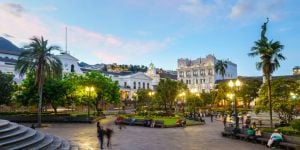 Work in Ecuador
Work in EcuadorEcuador is famous as a retirement haven. But you might not want to wait until retirement age to move there and ...
 Healthcare in Ecuador
Healthcare in EcuadorEcuador, as a fast-developing nation, has laws that are constantly evolving, but one thing is certain: the ongoing ...
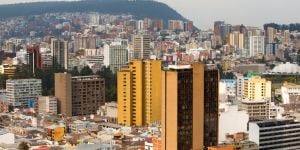 Opening a bank account in Ecuador
Opening a bank account in EcuadorA few years back, an expat would just breeze into an Ecuadorian bank, flash their passport and a bank account ...
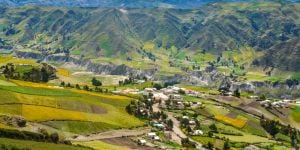 Family and children in Ecuador
Family and children in EcuadorFamily is everything to an Ecuadorian. The extended family unit is the most important aspect of life in Ecuador, ...
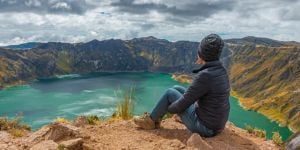 The Working Holiday Visa for Ecuador
The Working Holiday Visa for EcuadorEcuador is truly a paradise for adventure and nature lovers, and thanks to the Working Holiday Visa program, they ...
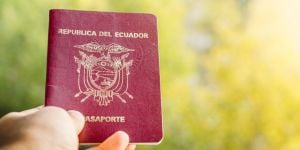 Permanent Residency in Ecuador
Permanent Residency in EcuadorEcuador is calling and you are ready to go and experience all that this gorgeous country has to offer. However, ...
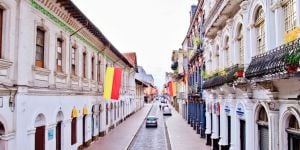 Work in Cuenca
Work in CuencaThere is no doubt that the Spanish colonial city of Cuenca is a wonderful place to call home, as demonstrated by ...
Find more topics on the Ecuador forum



